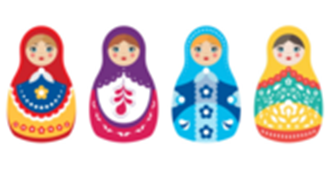Interviewing the Russian Population at BT

March 2, 2022
Beth Tfiloh’s student body contains a large Russian population, even enough to create a Russian club. So, to gain insight into their lives, I interviewed a variety of first-generation Americans with parents who hail from the former Soviet Union.
First, I interviewed Garrett R. ‘22 who takes great pride in his Slavic identity. His parents come from Ukraine and Siberia, and though he can understand Russian fluently, he cannot speak it well. His favorite Russian food is his mom’s borscht, a beet stew, because “it’s really good, it’s just the best.” He enjoys watching Nu Pogodi! (Well, Just You Wait!) a Soviet animated series. Despite his love for his heritage, he does not celebrate the Russian New Year. However, his family has traditions like sitting down before going on a trip.
With parents immigrating from Ukraine and Uzbekistan, Elan V. ‘23 speaks a mix of Russian and English with his family. Pilaf (rice with assorted ingredients) is his favorite Russian food and he grew up watching a Russian version of The Voice. As a child, Elan went to the “Russian store” often, a store which sells different Russian foods, but he does not go anymore. His family has superstitions such as not opening an umbrella nor whistling indoors.
Sabrina S. ‘23 has parents from Ukraine as well. She speaks Russian with her family and loves blintzes and kalduny (stuffed dumplings). She grew up watching Masha y Midved (Masha and the Bear), a show based on a Russian oral folktale. In addition to shopping at the Russian store with her grandma, she celebrates the Russian New Year by receiving presents and putting up a tree. She could think of many superstitions her family follows. For instance, one cannot toast with an empty glass, sit at the corner of a table, nor whistle indoors. Like Garrett, her family always sits down before going on a trip. A particularly interesting superstition was that if a bird poops on you, you will be rich! She believes the Russian Jews at BT are different from the other students at BT because they celebrate holidays differently; they eat in bigger portions, buffet style, and with more variety; and their parents employ different methods in disciplining their children.
Next, I interviewed Michael M. ‘25. His parents stem from Belarus and Moldova, though his mother moved to Israel from the USSR before moving to America where she met his father. Michael is fluent in Russian and often speaks it with his grandparents. Besides enjoying Russian foods such as pelmeni (meat dumplings) and olivyei (potato salad), he often attends the Russian store. He loves Bremenskai Muzekanti (The Bremen Town Musicians), a Soviet musical film based on a Brothers Grimm fairytale, and Nu Pogodi (Well, Just You Wait!). Celebrating the Russian New Year is his favorite custom and his family also has many superstitions they keep. Though they have the common one, no whistling in the house, he also mentioned that one cannot step over someone on the ground nor shake hands in a doorway or they will not grow.
Finally, I spoke to the heads of the Russian club: Julia G. ‘23 and Leila M. ‘23. Julia’s parents are from Siberia and Ukraine while Leila’s are from Azerbaijan. They both speak Russian with their family, however, Julia describes herself as fluent and Leila says she is “somewhat” fluent. A fan favorite, they love Nu Pogodi and Cheburashka, a popular animated Soviet film. Leila also loves Masha y Midved just like Sabrina. Also like Sabrina, they both love to eat blintzes, but the similarities end there. Julia’s other favorite foods are bulon (broth) and bitki (chicken cutlets) and Leila’s are pelmeni (meat dumplings) and hatchipuri (bread with cheese and egg). Both often visit the Russian store and celebrate the Russian New Year by putting up a tree and getting presents. They believe children of immigrants are raised differently than other Americans and Julia touched upon the difference in how they are disciplined. Leila has the custom of going to Europa, a Russian restaurant, for every occasion and Julia’s family always says z’bogam (with God) before traveling. Superstitions being a large part of Russian culture, they both had many to offer. Julia explained that one cannot walk in the path of a black cat nor show on your body where you got hurt. Leila related that one cannot say a bad dream out loud, cannot pour salt over the table nor pass it – meaning that to pass the salt, one must put it down on the table before another person picks it up.
Personally, I am a part of the BT Russian population with both my parents hailing from Belarus. I found these interviews to be an amazing opportunity to connect with people who grew up similarly to me. We watched the same shows, have the same superstitions, and eat the same foods. Despite our likeness, this highlighted the diversity in our upbringing. I hope this article reaches the non-Russian population of BT to achieve a greater understanding of their fellow students.

